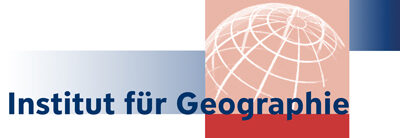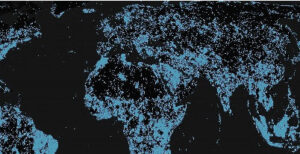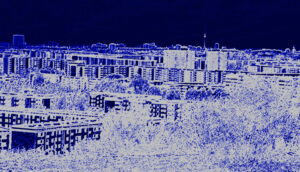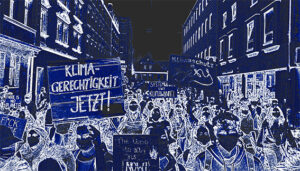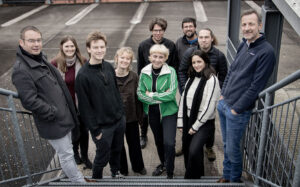Working group: Cultural, political and digital geographies (Glasze)
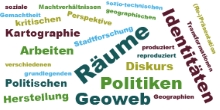
The research projects in the working group Cultural/Political/Digital Geographies at the Erlangen Chair of Cultural Geography (Glasze) share a discourse-theoretical perspective on social spaces that understand them as always produced in a specific way, potentially controversial and in this sense as cultural and political.
We develop contributions to the theoretical and methodological advancement of discourse studies in geography. In doing so, we are guided by a “broad” concept of discourse that goes beyond language and symbols.
Our research can largely be categorised into three areas:
The socio-technical disruptions known as the “digital transformation” or, in some cases, the “digital revolution” are fundamentally changing geographies. At the Chair of Cultural & Political Geography in Erlangen, we study these upheavals from a cultural, social, and political geographic perspective. Within the German-speaking geography we have established the research context of a “Digital Geography” together with other colleagues and are internationally and interdisciplinarily networked in this field.
We are investigating in several projects how the production and use of geographic information changes in the digital transformation and which inequalities are (re-)produced (e.g. research on OpenStreetMap, on the role of geodata in the documentation of human rights violations as well as on the social and political background of “smart city” projects). For several years, we have also been conducting research on the increasing geopoliticization of the digital transformation.
Cities are places where social dynamics are condensed. This is where social lines of difference meet and are negotiated. Here, questions of the configuration and regulation of interactions arise in a nuanced form.
In several projects, we have researched the establishment of privately organized enclaves in various urban regions around the world (e.g. “gated communities”, “business improvement disctricts”). In addition, we have studied the discursive stigmatization of certain urban neighborhoods and the legitimation of area-based support programs (especially “soziale Stadt” in Germany, “politique de la ville” in France).
In this research area, we at the Erlangen Chair of Cultural & Political Geography investigate how the production of certain spaces is intertwined with certain politics and the (re)production of social differentiations and identities.
In doing so, we research, for example, on changes in geopolitical ideas (e.g. on the metageographies “Europe” or “Francophonie”). On the level of cities, we deal, for example, with the culturalization and “religiousization” of urban integration policies.
Finn Dammann
- Email: finn.dammann@fau.de
- GeoData-Centre
Wetterkreuz 15
91058 Erlangen
“External” phd-candidates
- Nora Hahn-Hobeck MA, Erlangen
- Cate Turk MA, Perth (Australien)
Former Members of the Research Group
- Dr. Christoph Baumann (now in School Service)
- Dr. Christian Bittner (now: Research Data Services at the University Library in Bonn)
- Adam Brailich, M.A.
- Dr. Tim Elrick (now: Director of the Geographic Information Centre, McGill University, Montreal)
- Dr. habil. Henning Füller (now: Senior Researcher at the Institut für Geographie, HU Berlin)
- Dr. Mélina Germes (now: Senior Researcher at CNRS Bordeaux)
- Prof. Dr. Shadia Husseini de Araújo (now: Professor for Economic and Social Geography at the Departamento de Geografia da Universidade de Brasília)
- Dr. Günther Kramann
- Dr. Lama’a Mahmoud Mohammed Al-Orainat MA, Aquaba (Jordan)
- Prof. Dr. Boris Michel (now: Professor for Digital Geography at MLU Halle)
- Dr. Henning Schirmel (now: DB AG, Berlin)
- Dr. Andreas Tijé-Dra (now: Stadt Nürnberg)
- Dr. Betty Rouland (now: Researcher at Institut de recherche sur le Maghreb contemporain de Tunis (IRMC))
- Cate Turk M.A. (now: Perth, Autralia)
- Jun.-Prof. Dr. Florian Weber (now: Universität des Saarlandes)
